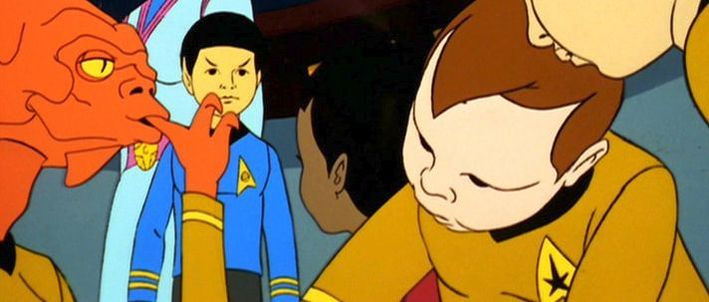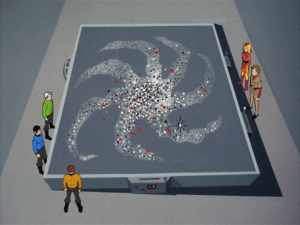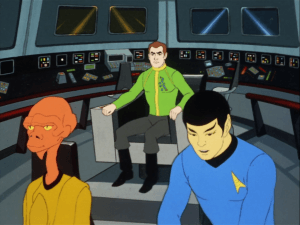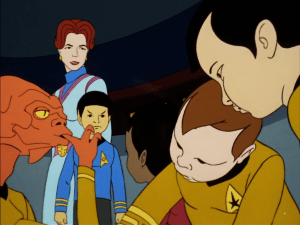
Having located a suitable star, they set a course. Spock explains to Kirk that the youngest crew member will “return to the time of birth” in roughly eighteen minutes “in real time,” but “long before that, we shall all be children.” This presents the very real possibility that they will soon be unable to operate the Enterprise. No sooner do those words leave Spock’s mouth than the voices of everyone on the bridge get at least a semitone higher. In a matter of minutes, Spock’s Vulcan metabolism has left him the only one capable of operating the ship. Or not. April reminds Spock that even he will soon regress too far and assumes command of the Enterprise once more. The plan works and the Enterprise returns safely to its own universe, though much of the crew has reverted to infancy. April decides a way to use the transporter to restore them to normal, and Sarah excitedly points out that she and her husband need not follow suit. They could quite literally get a second lease on life. But he declines and she acquiesces. Later, in recognition of April’s heroism, Starfleet waives his mandatory retirement, allowing him to remain ambassador-at-large.

I feel I should preface this by reminding everyone of just who I am as a person. That is to say, I am – and always have been – the kind of fan who enjoys deep dives into continuity, whether it’s ‘Star Trek’ or Spider-Man. Because of that, I can’t help but get excited on some level for “the episode where [the significant event] happens,” even when it turns out the episode isn’t especially good. And while I do tend to approach things more critically now than I did when I was ten, that base impulse remains. And since I’ve always had a particular fascination with Robert April (or perhaps it would be more accurate to say “the idea of Robert April”), this is an episode that my younger self couldn’t help but get excited for and by extension one for which I still have a soft spot. So the question then becomes whether or not it holds up.
I’d say “more or less.” And if it sounds like I’m dodging the question, you got me. I need something to write about for the next few hundred words, after all. But also it’s not really a clean cut yes or no. As an episode, ‘The Counter-Clock Incident’ is fine. It’s a fun ride with some interesting ideas behind it. But if you’re going to approach it as “the episode with Robert April,” then it frankly betrays some of the promise of its premise. Simply put, while it’s fun to meet April, he doesn’t really have enough to do. He spends most of the episode hanging around the bridge and occasionally contributing an explanation, while his wife is forgotten about for most of the runtime (including the entire second act). He would, I feel, have been better served if he’d been allowed to take command earlier in the episode, or at least played a more active role in driving the plot. Maybe something a little closer to the first season ‘TNG’ outing ‘Too Short a Season’? Bottom line, I wanted to see more of April, and while it’s not the worst thing to be left wanting more, it is nonetheless frustrating when you’re left wanting more because of wasted potential.

Also, while I, continuity fanboy whore that I am, appreciate the way the episode revels in ‘Trek’ lore, there are times where it just feels like we’re being beaten over the head with the reference hammer. Nowhere is this more prominent than in the first act of the episode. The first several minutes are basically non-stop backstory and continuity nods. Compare the reference to ‘All Our Yesterdays’ (“Oh, Captain Kirk, weren’t you there when Bet Niobe went boom?”) to the similar nod to ‘The Empath later on (in which the star Minara is mentioned and no attention is called to Kirk’s prior experience in the region). One of those is just more organic than the other. Of course, this all becomes moot once Karla Five’s ship appears and the remainder of the first act becomes a giant action scene.
It’s also a bit odd that the elevator pitch for this episode is “the original captain of the Enterprise comes aboard and is forced to take command when everyone aboard is de-aged,” and yet nobody becomes noticeably younger until the last five minutes of the episode. And speaking of the de-aging process, once it does finally start to set in, it is incredibly rapid in a way that’s inconsistent with what we’ve seen in the prior ten or so minutes we’ve spent in the reverse universe. To his credit, Bronson has since explained in interviews that the intent was for this to be the manifestation of a reversed counterpart to time dilation – the process, described by Einstein, by which a person traveling at or near the speed of light experiences the passage of time more slowly than a stationary observer. But that doesn’t really come across in the episode.
Also, once the de-aging does start to set in, the process is incredibly rapid in a way that’s inconsistent with what we’ve seen in the prior ten minutes we’ve spent in the reverse universe. To his credit, Bronson has since explained in interviews that the intent there was for this to be the manifestation of a reversed counterpart to time dilation – the process, described by Einstein, by which a person traveling at or near the speed of light experiences the passage of time more slowly than a stationary observer. But that doesn’t really come across in the episode.

The “reverse universe” concept creates an interesting gimmick for the episode and presents some potentially fascinating, but it also brings with it some bizarre leaps of logic. The Enterprise’s controls operate in reverse simply by virtue of the ship being in a parallel universe. Or maybe it’s the crew’s brains that are screwy, processing information in reverse simply by virtue of being in a parallel universe. I’m honestly not sure which of those is the more rational explanation. But perhaps the most bizarre logical leap of all is April’s decision to refuse his newfound youth. He merely says that he’s had a great life with Sarah and wouldn’t change any of it even if he could do it over again. But lovely as that sentiment is, it’s not what’s happening here! They’re not being offered a literal do-over!
There are things to like here, but it feels, I don’t know… rushed? Unpolished? I don’t dislike the episode, but I’d really love to see what they could have done with this story if they’d had a full forty-five minutes to work with. And maybe taken another pass or two at the script to either smooth out or other explain away some of the logical issues.
But what do you think of ‘The Counter-Clock Incident’? Am I overthinking it or is my fascination with Captain April leading me to give it more credit than it deserves? Let me know in the comments, and be sure to check back in two week’s time for the next ‘Final Frontier Friday’!
